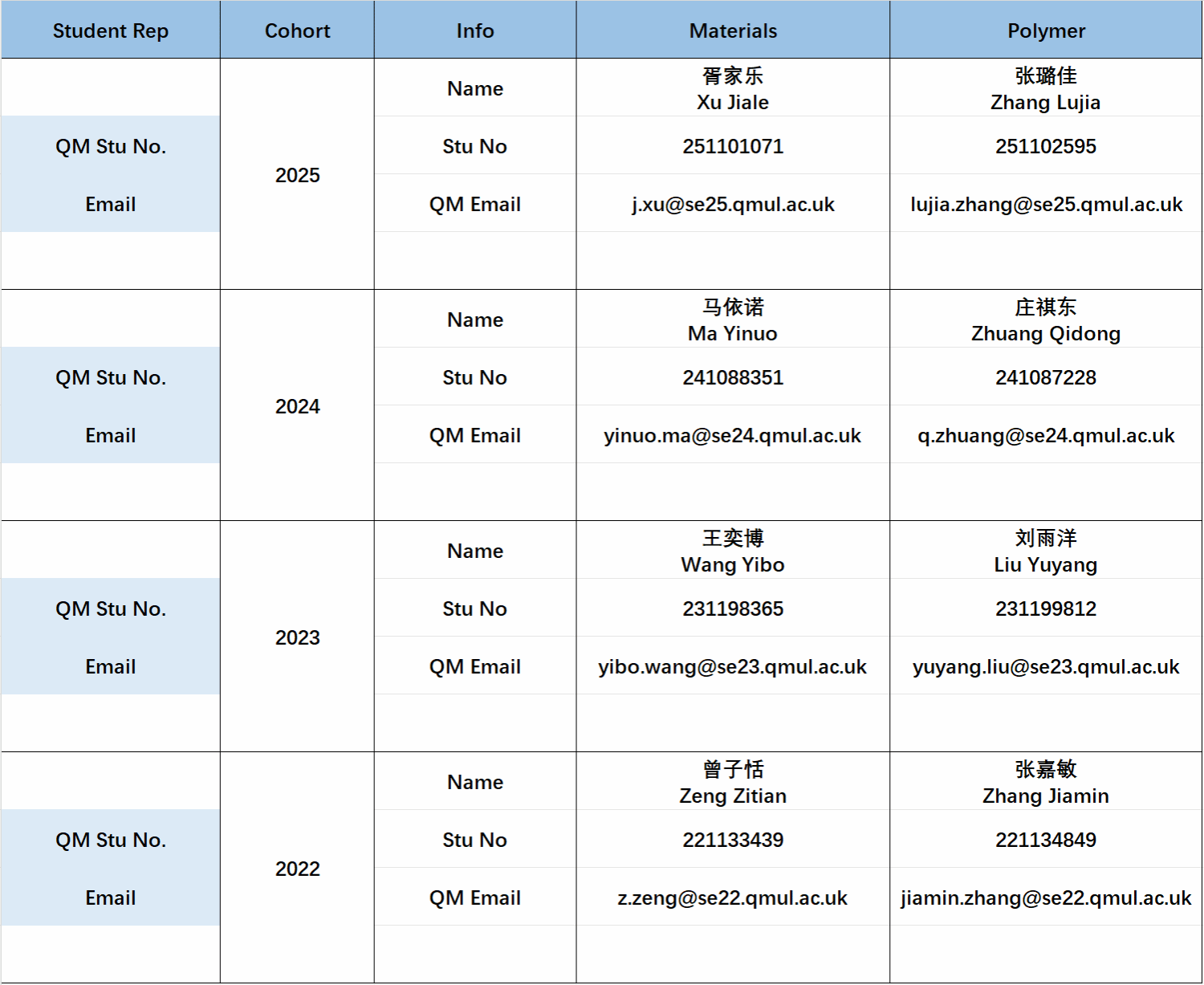Queen Mary University of London Engineering School, NPU
Queen Mary University of London Engineering School, NPU
Introduction of Student Voice Committee (SVC)
The Student Voice Committee (SVC) is the official organisation for effective communication between students, lecturers, and other staff, giving students the opportunity and channel to give feedback on their thinking and experiences in their study and life. Regularly holding SVC meetings is an important way to enhance the value of students' subject learning, ensure the quality of education and teaching, and enhance communication between students and the school.
How does it Work?
When is the meeting?
SVC meetings are held twice per semester, at the mid-term and at the end of the term. The time for the meeting shall be discussed by the person in charge with the participating course representatives, student representatives and faculty members about 10-15 working days in advance.
Who can participate?
Staff members who regularly attend SVC meetings include but are not limited to the leaders of the QM and NPU sides responsible for teaching and student affairs, the teaching affairs office, the student affairs office, the general affairs office, and the administrative office. Other teaching staff, professional service personnel, such as library or IT staff, should also be invited to attend meetings when necessary, but do not have the right to vote.
Student members who regularly attend SVC meetings include student representatives, and other invited attendees.
Staff members designate one person as the meeting secretary, who is responsible for writing the minutes of the meeting. The meeting secretary also has the right to vote.
Resolutions of the meeting only may take effect/ implement with the consent of more than half of the members.
Note for Absence: When staff members or student members are unable to attend the meeting, they should send an apology email to the SVC coordinator at least one day in advance and designate a representative.
Information and Data Collection
Once the meeting date is confirmed, the SVC coordinator would notify and invite all participants by email. Student representatives need to conduct investigations and collect students’ feedback and suggestions according to their respective responsibilities actively. The process of investigation and collection needs to be open, transparent and evidence-retained to ensure that the feedback information is valid, retroactive, fair and just, and can represent the interests of the majority of students.
Meeting Minutes
After the meeting, meeting secretaries will need submit the meeting minutes to all staff members for review.
After confirming that the content of the meeting minutes, the action-log and the person responsible of the relevant issues is accurate and allocated, meeting minutes will be released to the students on the SVC section on QMPlus landing page.
Student representatives should remind and promptly notify the students regarding the release as a means of feedback and follow-up the progress of the any further actions.
1. Who can become a Student Representative and How?
1.1 Definition of Student Representative
Student Representative: A student-voted "speaker" who speaks on behalf of the wider student body, and where appropriate, collaborates and coordinates work with other students with the same or similar authority. As the leader and service provider among students, student representatives need to have good organizational and coordination skills, truly represent the wishes of the majority of students, and actively help the school and staff build a bridge of communication. Student representatives' concerns should focus on the difficulties or problems that students encounter in their school life.
It is not always obvious whether a certain problem will affect students' study and life, so it is necessary for student representatives to discover and summarize in a timely manner from the perspective of students. As the primary communication link between staff and student, student representatives should be the transfer and processing hub for issues and information. As a position that requires comprehensive ability, student representatives need to have good communication skills, time management skills, organization and coordination skills, and a considerable degree of empathy. Excellent critical thinking and relatively good oral expression skills are the key to success.
1.2 Becoming a Student Representative
One student representative per cohort for each major.
Selection mechanism and time: In the first and second week of each semester, students will be notified of the selection of student representatives, and students are encouraged to sign up voluntarily or nominated by classmates and staffs.
If there are many candidates, candidates will be invited to attend an official interview in week 3. Vote and final selection of candidates will happen in weeks 4.
1.3 Work Content and Standards of Student Representative
1.3.1 Student Representatives should attend two SVC meetings per semester, with an average of 0.5-1 hours of work per week, including but not limited to the following:
• Participate in student leadership training.
• Collect feedback from groups of students, hold and record group meetings.
• Support and cooperate with staff member, lead and encourage students to participate the mid-term and end-semester survey on QMPlus module pages.
• Prepare for SVC meetings, submit SVC meeting report and follow up relevant feedback after the meeting.
• Update students with relevant news.
• Provide general advice, reference and assistance for students with individual issues, and refer them to appropriate departments or responsible persons.
1.3.2 Student representative adopts the "5R" standard process. which is:
• Receive feedback from students/teacher.
• Research the accuracy of information and to collect broad collective opinions.
• Raise your voice to ask questions/establish communication channels when appropriate.
• Record details the objectives, process and results of the event.
• Report feedback and follow-up implementations.
Rewards and Recognition
The school issues "Contribution Award" certificates and add marks to their volunteering service working hour to the student members who actively contributed and participated in various occasions, in order to affirm and reward the ability of the student members for their excellence in leadership and efforts. Basic principles and indicators are:
• Attend two SVC meetings per semester
• Participate in student leadership training
• Ability to actively collect and represent the opinions of the majority of students
• Ability to effectively use communication methods, explore the essence of issues, and find solutions
• Ability to provide timely and effective feedback to committees
• Ability to collaborate with others (student representatives, staff and other relevant staff)
Students Representatives of SVC

Should students have any other issues to raise with the SVC, please contact teacher Eleonora Pitta (email: e.pitta@qmul.ac.uk) or Ms. Hong in QM Xi’an Office (email: qc25297@qmul.ac.uk).

Northwestern Polytechnical University NPU e-Campus
Queen Mary University of London School of Engineering and Materials Science QMplus Chinese-Foreign Cooperation in Running Schools Regulatory Work Information Platform Chinese-Foreign Joint Education Committee Department of International Cooperation and Exchanges (Office of Hong Kong, Macao and Taiwan Affairs) Department of International Cooperation and Exchanges (Office of Hong Kong, Macao and Taiwan Affairs) QS World University RankingsLocation
Fourth Floor, East Teaching Building A, Chang’an Campus
Tel
+86-029-88431985/88431990 General Affairs Office
+86-029-88431982 Teaching Affairs Office
+86-029-88431987 Student Affairs Office
Post Code:710072

Copyright © Northwestern Polytechnical University 2016 ICP备案号:陕ICP备05010979